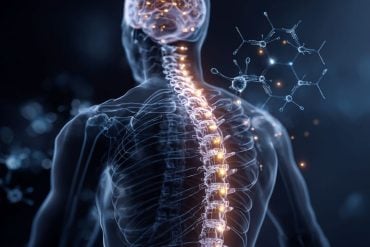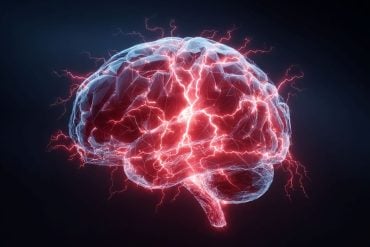Summary: Researchers say the Huntingtin gene affects brain development from an early age, even though most patients do not develop Huntington’s disease until later life.
Source: Cardiff University.
The inherited gene that leads to Huntington’s disease has been found to affect brain development from an early age, even though most patients don’t develop symptoms of the disease until they are between the ages of 30 and 50.
The findings of the study, by Cardiff University, University of Erlangen-Nuremberg and Lund University, which looked at brain function in mice, could help researchers to develop new treatments in the future that would be given from a young age, to delay the onset of the disease.
Huntington’s disease is caused by patients inheriting a faulty gene, which leads to the production of a toxic protein called mutant huntingtin. Mutant huntingtin protein slowly poisons specific groups of brain cells, leading to gradual dysfunction and decline in motor skills, cognitive abilities and behaviour over a twenty year period. The disease ultimately leads to patients needing 24 hour nursing care and is fatal.
Dr Florian Siebzehnrubl, from Cardiff University, said: “There is still no known cure for Huntington’s, so it is vital that we gain an understanding of the processes happening in the brain throughout a lifetime, so that we can develop effective treatments.

“Our new research gives us a better understanding of the point at which the mutant gene begins to influence the brain, and this will provide further detail that can allow us to develop potential treatments for this fatal disease that could be given from a younger age before people become symptomatic.”
It’s thought Huntington’s disease affects between one in 10,000 and one in 20,000 people and the disease affects men and women equally. In addition to there being no cure for the disease, there is also currently no way of stopping it from progressing, but treatment and support can help reduce some of the problems it causes.
Source: Cardiff University
Publisher: Organized by NeuroscienceNews.com.
Image Source: NeuroscienceNews.com image is credited to Cardiff University.
Original Research: Abstract for “Early postnatal behavioral, cellular, and molecular changes in models of Huntington disease are reversible by HDAC inhibition” by Florian A. Siebzehnrübl, Kerstin A. Raber, Yvonne K. Urbach, Anja Schulze-Krebs, Fabio Canneva, Sandra Moceri, Johanna Habermeyer, Dalila Achoui, Bhavana Gupta, Dennis A. Steindler, Michael Stephan, Huu Phuc Nguyen, Michael Bonin, Olaf Riess, Andreas Bauer, Ludwig Aigner, Sebastien Couillard-Despres, Martin Arce Paucar, Per Svenningsson, Alexander Osmand, Alexander Andreew, Claus Zabel, Andreas Weiss, Rainer Kuhn, Saliha Moussaoui, Ines Blockx, Annemie Van der Linden, Rachel Y. Cheong, Laurent Roybon, Åsa Petersén, and Stephan von Hörsten in PNAS. Published August 27 2018.
doi:10.1073/pnas.1807962115
[cbtabs][cbtab title=”MLA”]Cardiff University”Huntington’s Disease Starts in Childhood.” NeuroscienceNews. NeuroscienceNews, 3 September 2018.
<https://neurosciencenews.com/huntingtons-childhood-9786/>.[/cbtab][cbtab title=”APA”]Cardiff University(2018, September 3). Huntington’s Disease Starts in Childhood. NeuroscienceNews. Retrieved September 3 2018 from https://neurosciencenews.com/huntingtons-childhood-9786/[/cbtab][cbtab title=”Chicago”]Cardiff University”Huntington’s Disease Starts in Childhood.” https://neurosciencenews.com/huntingtons-childhood-9786/ (accessed September 3 2018).[/cbtab][/cbtabs]
Abstract
Early postnatal behavioral, cellular, and molecular changes in models of Huntington disease are reversible by HDAC inhibition
Huntington disease (HD) is an autosomal dominant neurodegenerative disorder caused by expanded CAG repeats in the huntingtin gene (HTT). Although mutant HTT is expressed during embryonic development and throughout life, clinical HD usually manifests later in adulthood. A number of studies document neurodevelopmental changes associated with mutant HTT, but whether these are reversible under therapy remains unclear. Here, we identify very early behavioral, molecular, and cellular changes in preweaning transgenic HD rats and mice. Reduced ultrasonic vocalization, loss of prepulse inhibition, and increased risk taking are accompanied by disturbances of dopaminergic regulation in vivo, reduced neuronal differentiation capacity in subventricular zone stem/progenitor cells, and impaired neuronal and oligodendrocyte differentiation of mouse embryo-derived neural stem cells in vitro. Interventional treatment of this early phenotype with the histone deacetylase inhibitor (HDACi) LBH589 led to significant improvement in behavioral changes and markers of dopaminergic neurotransmission and complete reversal of aberrant neuronal differentiation in vitro and in vivo. Our data support the notion that neurodevelopmental changes contribute to the prodromal phase of HD and that early, presymptomatic intervention using HDACi may represent a promising novel treatment approach for HD.






